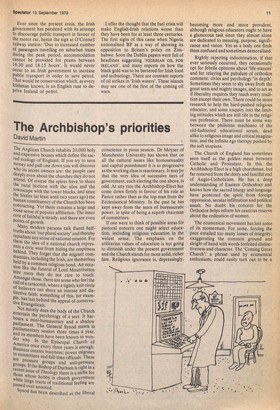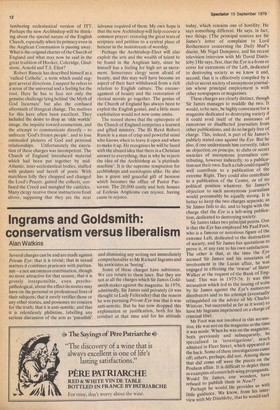The Archbishop's priorities
David Martin
The Anglican Church inhabits 20,000 holy and expensive houses which define the sacred ecology of England. If you try to save money and pull one down you will discover who its secret owners are: the people care deeply even about the churches they do not attend. Of course the spires have to share the rural horizon with the silos and the towescape with the tower blocks, and since the Sixties (at least until two years ago) the human constituency of the Church has been contracting. Yet there remains a large and loose sense of popular affiliation. The inner core of faithful is steady, and there are even Points of growth. Many modern parsons talk fluent halftruths about 'our plural society' and thereby repudiate any sense of national mission. For them the idea of a national church represents a civic west front hiding the emptiness behind. They forget that the migrant communities, including the Irish, are themselves held by a common religious bond. An occasion like the funeral of Lord Mountbatten stirs roots they do not care to touch. Amongst those, there are some who feel the call of a catacomb, where a tightly knit circle of believers can share an intense and distinctive faith: something of this, for example, has lain behind the appeal of conservative Evangelicals. Not merely does the body of the Church entertain the psychology of a sect. It harbours a mini-bureaucracy and a shadow parliament. The General Synod meets in Parliamentary session three times a year, and its members have been 'known to wonder why, In the Episcopal Church of America once every three years is enough. Business creates busyness; power migrates to committees and full-time officials, There are pressure groups and anti-pressure groups. If the Bishop of Durham is right in a recent ,issue of Theology there is a niche for those whose hobby is church government While large tracts of traditional feeling are passed over unnoted. Synod has been described as the liberal conscience in pious session. Dr Moyser of Manchester University has shown that on all the cultural issues like homosexuality and capital punishment it is as progressive as the working class is reactionary. It maybe that the very idea of successive tiers of government, each electing the one above, is odd. At any rate the Archbishop-Elect has come down firmly in favour of his role as Pastor rather than as the top man from the Ecclesiastical Ministry. In the past he has , kept away from the seats of bureaucratic power, in spite of being a superb chairman of committees.
If one were to think of possible areas for pastoral concern one might select education, including religious education in the widest sense. The emphasis on the utilitarian values of education is not going to diminish under the present government and the Church stands for more solid, richer fare. Religious ignorance is, depressingly. becoming more and more prevalent, although religious educators ought to have a glamorous task since they almost alone are dedicated to meaning, purpose, significance and vision. Yet as a body one finds them confused and sometimes demoralised.
Rightly rejecting indoctrination, if that ever seriously occurred, they occasionally opt for febrile opinions about `life-stances' and for relaying the pabulum of orthodox comment: civics and psychology 'in depth'. Sometimes they seem to shy away from the great texts and mighty images, and to act as if liberality requires they teach every tradition except their own. There could be more research to help the hard-pushed religious educator, and some enquiry into the limiting attitudes which are still rife in the religious profession. There must be some way between the philistine machismo of the old-fashioned educational scrum, dead alike to religious image and critical imagination, and the infinite ego therapy pushed by the soft utopians.
The Church of England has sometimes seen itself as the golden mean between Catholic and Protestant. In this the Archbishop-Elect is a high churchman, but far removed from the dotty and fanciful end of Anglo-Catholicism. He has a deep understanding of Eastern Orthodoxy and knows how the sacred liturgy and language have protected the spirit from foreign oppression, secular infiltration and political assult. No doubt his concern for the Orthodox helps inform his cautious reserve about the ordination of women.
The ecumenical movement has lost some of its momentum. For some, forcing the pace entailed too many losses of integrity; exaggerating the common ground and sleight of hand with words forfeited distinctiveness and character. The 'Coming Great Church', a phrase used by ecumenical enthusiasts, could easily turn out to be a lumbering ecclesiastical version of ITT. Perhaps the new Archbishop will be thinking about the special nature of the English Church, especially when its primacy even in the Anglican Communion is passing away. What is the original charter of the Church of England and what may now be said in the great tradition of Hooker, Coleridge, Gladstone, Arnold and T.S. Eliot?
Robert Runcie has described himself as a 'radical Catholic', a term which could suggest several directions. I suspect he refers to a sense of the universal and a feeling for the root. Here he has to face not only the genuine challenge lying behind 'the Myth of God Incarnate' but also the confused aftermath of liturgical change. The motives for this have often been excellent. They included the desire to drop an `olde worlde' image, the impulse toward ecumenism, and the attempt to communicate directly — to unfreeze 'God's frozen people', and to lose outmoded pictures of God and personal relationships. Unfortunately the execution of these charges was incompetent. The Church of England introduced material which had been put together by midAtlantic, inter-ecclesiastical bodies, stuffed with pedants and bereft of poets. With matchless folly they chopped and changed the Lord's Prayer, gutted the collects, confused the Creed and mangled the canticles. Many clergy receive these instructions from above, supposing that they are the next -advance required of them. My own hope is that the new Archbishop will help recover a common prayer: restoring the great texts of scripture and petition to a central place of honour in the mainstream of worship.
Perhaps the Archbishop-Elect will also exploit the arts and the wealth of talent to be found in the Anglican laity, since he himself has a feeling for high art as sacrament. Sometimes clergy seem afraid of beauty, and this may well have become an aspect of their hurt withdrawal from a rich relation to English culture. The encouragement of beauty and the restoration of clerical morale go together. The genius of the Church of England has always been to exploit the English genius, and a little more exploitation would not now come amiss.
The record shows that the episcopate of the Church of England comprises a learned and gifted ministry. The Rt Revd Robert Runcie is a man of crisp and powerful mind who knows when to leave it open and when to make it up. He recognises he will be faced with the absurd idea that there is a Christian answer to everything; that is why he rejects the idea of the Archbishop as 'a platitude machine'. It is the supreme temptation for archbishops and sociologists alike. He also has a grave and graceful gift of benison which becomes the office of Pastor Pastorum. The 20,000 costly and holy houses of Ecclesia Anglicana can rejoice, having cause to rejoice.



































 Previous page
Previous page